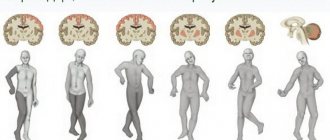What is pessimism?
What is pessimism? This is a peculiar tendency to think negatively and expect a negative result, to live without hope for the best in the future.
It is a creativity killer, emotionally traumatizing, interferes with professional development, and harms health. According to experts, becoming a hostage to a bad mood is much easier than maintaining a positive attitude.
A person’s pessimistic attitude can destroy relationships and alienate family and friends. Negatively minded people have every chance of not only aggravating problems and stress, but also falling into a state of depression.
A pessimist may feel helpless and defenseless. He does not believe that the result can be influenced by certain actions and efforts. These can be said to be passive observers of the world around them. They believe that achieving success is not under a person's control. A pessimist always imagines the worst-case scenario for the situation.
How to stop being a pessimist?
It is better to be a supporter of optimism, how to learn to look at the world optimistically? This is definitely real. The main thing is desire and patience.
Thus, to become an optimist it is recommended:
- Focus on the positive in your own life
Summing up daily results, memories of successfully completed events, keeping a diary for good deeds, things and even minor achievements will help. This helps to shift attention to positive events in life.
- Look into the future
Quarrels, disagreements, and conflicts periodically happen in the life of every participant in a partnership. It is important to treat them correctly and learn lessons, work on yourself and relationships. It's okay to make mistakes. This is not a reason to retreat. It is necessary to correct mistakes if possible and move forward.
- Do good
People can do something good for others, not just improve their lives. By helping others, a person is fueled by positivity.
- Communicate more with optimists
The environment always plays an important role in the life of each of us. When a person is among those who have positive thinking, he himself begins to look at the world differently and find reasons for joy.
- Don't wait, but act
You should stop setting yourself up for a negative outcome, programming for failure from the beginning and waiting for negative consequences. And even if you fail, you shouldn’t dwell on it. It's better to learn a lesson and move on. Any experience is a step towards a realized goal.
Pessimism or optimism?
If we compare pessimism with optimism, we get an illustration of their characteristic properties:
- Optimists exude cheerfulness and cheerfulness, while pessimists exude doom and discontent.
- An optimistic attitude strengthens the will, self-confidence and goodwill, while a pessimistic one has a depressing effect.
- An optimist expects difficulties, but sincerely believes in success and a good ending. A pessimist finds something bad in any situation.
- Optimistic people, unlike pessimists, are always in a good mood. They find a way out of the most difficult situations with a smile on their face and hope for the best. A pessimist always prepares for the worst, but quickly gives up in difficult conditions.
- Optimists are more energetic and efficient than pessimists.
Meaning of concepts
Translated from Latin, the name optimism means “best.” There is an opinion that in a certain sense this is reminiscent of happiness or a view of the world through the eyes of a person wearing rose-colored glasses. However, from the point of view of positive psychology experts, this person does not ignore life's difficulties. He just has a completely different approach to them. This worldview ensures the presence of a full-fledged interpersonal space even in unfavorable conditions. And:
- reduces the chances of becoming depressed and anxious;
- promotes longevity;
- helps to establish closer relationships with others;
- teaches you to survive in a difficult situation.
A person who tends to think positively recognizes and accepts any negative event on his life’s path. However, he is not inclined to blame himself for failure or negative results. Such people always live in hope that everything will be fine in the future. When pessimists are just trying to find the source of failure, optimists are already looking for a solution to the problem.
Now let's figure out what pessimism means. The word itself is translated as “worst”. Philosophy views the worldview of a pessimist as a belief in the prevalence of suffering in our world and the senseless battle of good and evil, as well as injustice in life. A pessimist sees only negative aspects in everything, considering the world bad and life meaningless. Melancholy is considered a pathological form of pessimistic thinking.
However, this worldview also has its advantages. Pessimist:
- Always ready for the worst outcome
In difficult situations, this often helps not to give up, analyze the situation and find a way out.
- Characterized by forethought
Once in a situation, he does everything possible to prevent a similar problem.
- Weighs the pros and cons
This is valuable in solving production problems, where the slightest mistake leads to huge losses.
- Intellectual
He thinks through everything to the smallest detail, always has backup steps, and has creative thoughts, although he is not inclined to share them with others.
- Unobtrusive
They do not force their point of view on anyone, which is valuable in resolving controversial issues.
Why does a person perceive everything negatively?
There may be several reasons for pessimism:
- Genetic predisposition
A person can be born a true pessimist. However, these people are not doomed. They can be helped by adjusting their perception and attitude towards life through education and conditions for interaction with other people.
- Education methods
If a person is always treated as a loser, criticized, suppressed any manifestation of individuality, controlled every step, compared with more successful people, he will become a pessimist. Often parents make these mistakes without thinking about the consequences for the child.
- Example of parents
A child cannot develop positive thinking when parents are pessimistic. And this thinking can be passed on from generation to generation. However, there are exceptions. The child, seeing how his pessimistic parents lived, changed his worldview and became successful and happy.
- Stressful situations
Being under constant stress or losing an important person or something significant can change your attitude towards life to the opposite of that of the most notorious optimist. In addition, an optimistic mood is threatened by chronic fatigue and hopeless vanity.
- Age
Youth usually gives a lot of opportunities, time and energy to make changes in your life. In middle age there is not much energy, time and health. And old age is just around the corner. During this period, many people give up their positions and cannot cope with the workload.
The most important character trait of a trader
I personally consider “will” and “reason” to be the most important qualities. You need “mind” - the ability to analyze and, above all, introspection, the ability to see your mistakes and accept them. And you need the “will” to act as your reason demands, and not as your versatile and rather vicious ego wants. Everything else, including the “delayed gratification” indicated in the startpost, is a consequence of these qualities.
In the next topic, where this sad guy, as it turned out, banned my comments, it is argued that psychology does not have a special role. As it does not play a special role in landing an airliner or heart surgery. And, in general, I agree with this, although not in that sense at all.
You see, it doesn’t really play a significant role, because aviation and surgery initially select people with very specific qualities and character traits. No one will trust an absent-minded dreamer with a scalpel and a steering wheel - they will be eliminated at the training stage, if not during the entrance exams to flight school and medical institute. But whoever wants to get involved in stock speculation is why the problem of psychology is acute
Because eggs are either there or not, and it depends on this whether we are facing a grandfather or a grandmother. In surgery and aviation, roughly speaking, grandmothers are weeded out, but in trading, instead, they publish an incredible number of courses, books and other nonsense on the topic “how to grow eggs and become a grandfather.” But users of these services will not be able to become grandfathers; at best, they will simply lose money, at worst, they will become homunculi, seriously crippling their psyche.
Of course, everyone has a “growth zone” where they can actually improve their characteristics through (self-)development. But it is quite limited and finite. If a person initially does not have the qualities necessary to engage in stock speculation, it is usually not possible to develop them. Generally speaking, the “absent-minded dreamer,” since I took such an example, has quite positive qualities that will allow him to realize himself in art, for example, or where warmth and participation are required. Trading is the territory of cruel and calculating *lucks. How do you imagine the transformation of a kind, sympathetic and dreamy person into a cruel and calculating *luck? What courses will help him :)? The maximum that is available to him is to simply turn into a *lucky guy, but he will not become either cruel or calculating in the sense that cold calculation will not prevail over his emotions, it does not develop, it either exists or it doesn’t.
We haven't finished anything yet! Georgy Cherdantsev's optimistic view of the Russian national team's game
The optimistic view of a commentator who worked on the Russia-South Korea match live on Channel One.
THE TEAM QUICKLY RETURNED TO THE GAME
You can win national titles as much as you like, be included in the lists of the best of the best published by the press, but only at the World Cup everything is according to Hamburg.
Surprisingly, for people like Igor Akinfeev, who seem to have seen everything in football, there is such a thing as jitters, excitement and, as a result, an unsuccessful game. Yes, the starting lineup of the Russian national team was entirely made up of tournament debutants, yes, many did not make it into the game, they were worried, they were enslaved and afraid of making a mistake, and all of them, including Igor, are living people, and people tend to make mistakes.
It’s customary for us to start with what we didn’t like, what was bad, that is, with the negative. I'll start with what was good. I liked that the team quickly returned to the game. Commenting on the match, he said after the missed goal - everything that is done is for the better; perhaps the missed goal will finally liberate the team, and it will play more actively in attack, there is nothing more to lose. And they came back, equalizing the score six minutes later!
It is symbolic that the first goal of the Russian national team at the World Cup was scored by the only player who has experience participating in such tournaments - Alexander Kerzhakov.
"PHYSICS" IS OKAY
At the end of the match, the Koreans literally fell from fatigue. The stuffiness eventually killed the opponent, and after the final whistle the Koreans fell exhausted and almost unconscious onto the turf of the Pantanal arena. Our team went to the locker room on their own two feet. That is, the team is physically prepared well. Psychologically too: otherwise they would not have been able to return to the game so quickly after such a ridiculous goal.
I liked the performance of the new national team captain. I think Vasily Berezutsky, as well as Sergei Ignashevich, were the best players in our team, for whom, in my opinion, there are no questions. Except for one thing: who will replace them when they finish their career in ten years?
REPLACEMENTS PLAYED
I liked that the players who came on as substitutes quickly got into the game, and it was thanks to their efforts that the Russian team equalized the score and kept its chances of reaching the playoffs for the first time in history approximately the same as they were before the start of the tournament. But a defeat in the opening match would significantly reduce these chances.
I think Capello will make changes to the starting line-up for the match against Belgium. After all, for him it was, in fact, a debut. It is one thing to watch players in friendly matches, and quite another to evaluate, first of all, the psychological stability of football players who left a good impression in matches in which there was a slightly different degree of responsibility. Skill has nothing to do with it. I am sure that Capello has long understood what this or that national team player is capable of in principle.
WHERE IS THE RISK?
What I categorically did not like was the almost complete absence of aggravating, risky passes in attack. It seems that ours played as if they were holding in their minds a printout of technical and tactical actions, on the basis of which Capello would decide whether to play the player for the next match or not. So, instead of trying to sharpen the game, they passed back and forth.
Here, of course, one cannot help but recall Shirokov’s absence. They say that no one is irreplaceable. This is not true when it comes to a creative profession, which, of course, is football. Roman is irreplaceable in this team. He is the only player on our team who is not afraid to take risks and make forward passes. Those who played in the main lineup against Korea in the middle of the field did not cope with the tasks that Shirokov solved. I really hope that Capello will still believe in Dzagoev and Alan, who does not need to be compared with Shirokov (they are different both in role and in terms of playing characteristics), will be able to bring much-needed improvisation and the last pass to the attack.
It’s a pity that Yuri Zhirkov somehow disappeared on the field, however, we still have very decent flanks. Perhaps Samedov was worried, but I hope he will still play his best match in Brazil. But Kombarov made two excellent passes into the penalty area, and we were once again convinced that it is difficult for Kokorin to play as a central striker, who is often forced to fight for the ball without speed and space, and without them it is difficult for Alexander.
BRAVE, TEAM!
The Russian national team nevertheless saved the game in a very difficult match in all respects, giving Capello a reason for reflection and purely coaching decisions that should follow for the next match. Tactics are tactics, here, of course, the coaching staff will figure it out, but I would like to wish our guys to be less enslaved and play more boldly in attack.
The most difficult thing was to start, after 12 years, to remind all of us and ourselves what it was like to be full-fledged participants in the World Cup. This page has been turned, now we need to move on and just play football, play the way our players basically know how, and then finally the Russian team will be able to advance from the group at the World Cup for the first time in its history.
Maybe it’s good that we didn’t start out spectacular in terms of the quality of the game and the results. This means there is something to work on and something to add to. Compare 2008, when our first match was outright lost to Spain, and 2012, when we started out strong and ended up... No, in Brazil we haven’t finished anything yet, we’ve just started. Everything is ahead!
Why the Russia-South Korea match was one of the worst at the World Cup. Analytics by Mikhail Borzykin
Match: Russia - South Korea
All the news of the World Cup on the website sovsport.ru
SOURCE KP.RU
Is it possible to become an optimist?
Optimism – a choice of fate or an acquired quality “Are optimists born or made?” - Many people would like to know the answer to this question. It especially worries those whose views on life can be called pessimistic. When these people hear that optimism is an innate quality, hope for change disappears. And when they learn that optimism can be acquired, faith in a new life returns. So which statement should you believe?
Let's consider the first option, which says that you just need to be born with an optimistic attitude. Undoubtedly, there is no smoke without fire, and some truth can be found in this statement. Everyone has probably heard about the well-known four types of temperament - melancholic, choleric, phlegmatic and sanguine. The type of temperament is something that cannot be acquired during life; rather, it is an innate feature. Sanguine and choleric people can be safely described as active people prone to a positive attitude. But note that it cannot be said that both choleric and sanguine people can only be positive. And, melancholic and phlegmatic people may not be pessimists! It’s just that active types of temperament have a greater tendency towards optimism, while phlegmatic people have the opposite.
Acquired optimism
Now let's talk about a more realistic option - acquired optimism. Why is this option more reliable? After many studies by scientists, it was concluded that a person acquires a negative or positive outlook on life over time. The acquisition of an outlook on life is facilitated by factors such as upbringing and environmental influences. But this does not mean that a child surrounded by negative factors will only have a negative attitude throughout his life.
Many people are interested in how to acquire that cherished optimism. First, you need to start with yourself. Do not forget that the world around us is, as it were, our mirror image. The way we see the world is the way we are inside. Therefore, the desire to change for the better is the first step on the path to optimism.
Of course, sometimes it’s worth fighting against circumstances. To begin with, free your life from people who bring little good into it and oppress you. But this does not mean that you need to get rid of and distance yourself from all the people close to you if they are not optimistic. As you know, positivity is a contagious feeling. Therefore, try to give optimism to those who are deprived of it.
Looking for something good in everything is a talent characteristic of happy and optimistic people.
Look for happiness in every moment, enjoy every minute of life and love what surrounds you. If you set your mind to this, your life will change beyond recognition. Even if it seems to you that it is not in your position to become an optimist, you are deeply mistaken. Do you think that a person whose life is even more difficult than yours cannot be an optimist? But in vain! Circumstances affect everyone differently. The main thing is what your view of the situation is.
Description
V. E. Makovsky “Optimist and Pessimist” (1893)
A well-known example of the opposition between optimism and pessimism is a person’s judgment about a glass filled exactly half with water or other liquid. An optimist is said to believe that the glass is half full, as opposed to a pessimist who believes that the glass is half empty.
In philosophy, optimism is associated with Gottfried Leibniz[2], who believed that we live in “the best of all possible worlds.”
Scientific research shows that optimism promotes health, namely:
- prevents the emergence of a state of learned helplessness, and, therefore, maintains the immune system in constant readiness;
- promotes healthy lifestyle and timely consultation with a doctor;
- optimists find it easier to establish and maintain friendships, and the presence of social support is one of the conditions for maintaining good health[3].
Martin Seligman defines optimism as a style of thinking in which a person considers failures to be random and unstable over time, and good events as logical and natural. In contrast to a pessimist who considers failures to be commonplace, and good events to be random, in no way related to his merits and merits. (4. Martin Seligman “New positive psychology. A scientific view of happiness and the meaning of life.” 2005. Chapter 6. “An optimistic attitude towards the future”) In the same book there is a test to determine your optimism. As well as a method for developing optimism in yourself “Fa-We-Re-Do-E” and 4 ways to make the refutation of pessimistic thoughts convincing.










